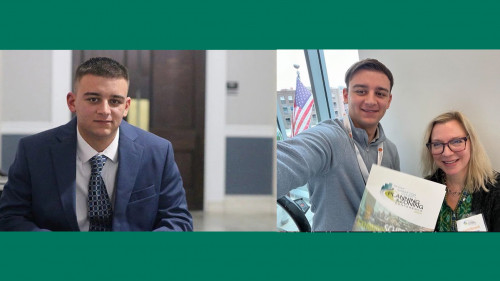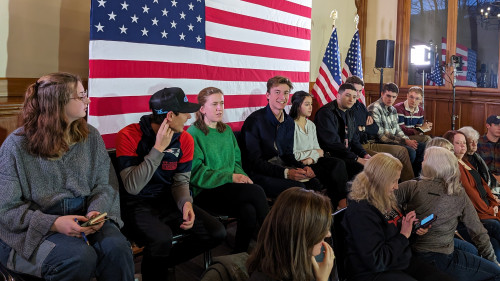
A few days before a draft decision on Roe v. Wade was leaked from the U.S. Supreme Court, setting off a national firestorm of controversy and criticism, Siena hosted a panel discussion on the highest court in the land, and to what extent it has become politically polarized during its 2021-22 term.
The April 27 event featured the results of a Siena College Research Institute poll developed with Siena’s Center for the Study of Government and Politics, followed by a panel discussion with a keynote from Ilya Somin, J.D., a professor of law at George Mason University; and remarks from Ava Ayers, J.D., professor of law at Albany Law School, the Hon. Mae D’Agostino ’77 J.D., district judge for the Northern District of New York, and SCRI Director Don Levy, Ph.D.
Somin agreed that the Court has become more contentious in recent years, judging from the heavily lopsided confirmation votes from the U.S. Senate.
“The general public is probably less divided on the Supreme Court than activists or politicians,” he said. “The court is not free of bias, but there is far less bias than from career politicians.”
As to whether “outside actors” bring pressure to bear on the court?
“Yes. This has happened since the dawn of the republic.”
Somin noted that a high percentage of Americans can’t identify even one Supreme Court justice, but are generally more aware of cases and issues, which was borne out by the results of the SCRI poll. The SCRI surveyed a random sample of 1,000 Americans in March about their overall and specific assessments of the Supreme Court and its justices. The results show a need for awareness about the court and how it operates.
Regarding the question “Do you think the court has or has not become so partisan that can no longer perform its constitutional function?”: 41 percent said it is too partisan; 31 percent said not too partisan; and 28 percent didn’t know.
For the question: “Do you think that the liberal/conservative justices are guided by their personal politics when they decide a case?”: 59 percent believe both liberal and conservative judges are either completely or somewhat guided.
Ayers noted that justices voting in a bloc “does not mean they voted in bad faith,” while D’Agostino said that all judges are human beings and a product of the way they were raised, but it is still incumbent upon them to be impartial.
“You can’t separate yourself from who you are, but anyone who makes assumptions as to how I will judge because of my background is being very foolish,” she said. “What I do is a sacred mission.”
Leonard Cutler, Ph.D., professor of political science and the pre-law advisor at Siena, said the intent of the event was to provide a balance of views and perspectives on the role and significance of the Supreme Court in our lives as American citizens.
“I believe that was clearly demonstrated by the panelists who contributed to that discussion, and through the poll results,” said Cutler. “It was a wonderful opportunity for the students to share original research results with their peers and a wider audience. College students should be the direct beneficiaries of learning not only who the justices are that serve on SCOTUS but the ways in which they impact our lives given the constitutional issues they address each and every term they are in session.”
The panel was moderated by Nicholas Discala ’22, president of Siena’s pre-law society.
“The event was a great experience for all of us, and I am glad so many of my fellow students had the opportunity to hear from an ideologically diverse group of legal scholars and professionals,” he said. “It is deeply important that we, as the next generation of legal professionals, engage and discuss the role and impact of our nation’s highest court, and Siena students’ commitment to the mission was well displayed at our event. All the panelists offered thoughtful and insightful observations to the discussion and we are especially grateful for their participation.”
Daniel Solis ’24 and Sami DeRagon ‘22 helped plan the logistics of the event and worked directly with Levy and the SCRI to develop and interpret the results of the SCOTUS poll.
“The Supreme Court contains nine of the most influential and powerful people in this country,” said Solis. “Undergrads should be knowledgeable about who they are and understand the power that the Supreme Court has in the way laws work in the United States.”

